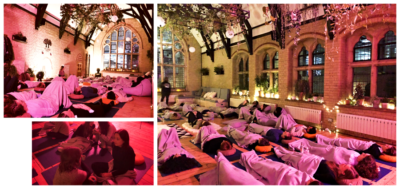The journey to entrepreneurship is an all-encompassing one requiring tenacious drive, vision, energy, and enthusiasm. However, a journey in need of such solo dedication can be seriously isolating and is why entrepreneurship leaves many founders and freelancers lonely.
What’s more, young entrepreneurs have the added weight of experiencing this in the midst of a loneliness epidemic that has been found to plague many young people today.
While being your own boss can trigger an immense sense of achievement, the lack of similar people to relate to and the unsociable working hours can come with a harsh psychological price.
With the successes that some entrepreneurial journeys can bring, there’s also the quiet reality of loneliness and how it manifests as a constant and seemingly incurable feeling.
Writing for Inc., one entrepreneur likens this emotion to “a closeted yearning in most of us to connect communally, safely, discretely.”
Investing in mental health alongside other assets
Scientifically, loneliness is a mechanism of survival that drives us to seek out social situations with other humans.
And as socializing and being part of a community is key to our survival, not being close to people can feel unnatural and agonizingly painful.

Loneliness is not only difficult to live with, it’s also a danger to public health and as Covid-19 has pushed everyone into an increasingly virtual world, the loneliness felt by the entrepreneur defined by working from home and spending time in front of a screen opposed to going out, is now felt by many.
The mental health impacts of self-employment have been well researched, finding that loneliness is prevalent amongst freelancers and the mental cost of failing as an entrepreneur is significant.
A study last year conducted by researcher at the University of San Francisco Michael A. Freeman discovered that start-up founders are twice as likely to suffer from depression, twice as likely to have suicidal thoughts and three times more likely to suffer from substance abuse.
Being an entrepreneur comes with the pressure and expectation of putting business first which can lead to the neglect of personal and mental needs.
Taking a break can be impossible when you can only afford to hire a small amount of staff and lack of sleep and working 24/7 is also associated with strength and success, making it even harder for founders to prioritise their mental health.
How loneliness can manifest
Being able to work flexible hours can evaporate a regular routine and make way for negative habits associated with celebration, relaxation, and the alleviation of stress caused by business losses.
The skills of determination, competitiveness and hard work that lead many founders to success can cross over to the way that entrepreneurs use and sometimes abuse substances.
Peter Shallard, ‘The Shrink for Entrepreneurs’ explains how “entrepreneurs have a disposition to addictive and compulsive behaviour.”
It’s that pause from thinking fuelled by a bad habit that can plague those working prolonged hours and having to continually solve difficult tasks.
Overtime, mental health issues such as depression and anxiety can manifest or become exasperated for the stereotypical lonely entrepreneur.
The life of an entrepreneur can cause many heavy emotions to be buried below the workaholic surface and once the decision is made to run your own company, the consequences of that decision, whether good or bad, are inescapable.
Overcoming loneliness
In our increasingly isolated society, young entrepreneurs can and must ensure that they thrive socially while embarking on their business journey.
Entrepreneurs need to secure a social circle and peer group as much as they need to concentrate on other business needs.

These communities don’t have to be in person, they can come from online sources such as zoom meet-ups and groups on social media of likeminded people who are also embarking on business or self-employment journeys.
Young founders could benefit from a mentor to help them navigate business, forge connections, and provide an understanding voice and ear.
Teaming up with other entrepreneurs for specific projects can also be a fantastic way to alleviate the burden of being a sole founder.
Developing a life outside of work is key to helping combat loneliness and other mental health issues as investing in hobbies and activities outside of work helps retain a self-identity.
Becoming a founder offers an exciting and unpredictable journey, but it needn’t be one that you go on alone.
There are many ways to find and connect with individuals in the same situation both on and offline, it just takes time and consistency.
The key is prioritising socialising as a key part of running your business alongside making a profit, hiring employees, and securing investment.
For information and further support on mental health, please see Mind.org.uk
Written By: Tali Ramsey – a freelance writer and editor covering tech, futurism, society, and contemporary art.
Images Copyright – Shutterstock (mine.art) / Pexels
Updated – 10th January 2021
More Stories
The UK-wide 31 days of ‘creativity…changing the world one tic at a time’
Business Owners Share Their ‘Insider Tips’ On How They Manage Mental Health At Work
Rapitation – a new concept using Rap music and Poetry to promote mental health fitness
How My Food Business Saved My Life And Why Resilience Is Key To Entrepreneurship













